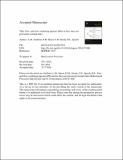Files in this item
Fast- and slow-exploring pigeons differ in how they use previously learned rules
Item metadata
| dc.contributor.author | Guillette, L. M. | |
| dc.contributor.author | Baron, D. M. | |
| dc.contributor.author | Sturdy, C. B. | |
| dc.contributor.author | Spetch, M. L. | |
| dc.date.accessioned | 2017-08-25T23:31:56Z | |
| dc.date.available | 2017-08-25T23:31:56Z | |
| dc.date.issued | 2017-01 | |
| dc.identifier | 245294307 | |
| dc.identifier | 1e9c5961-f119-4557-8f97-4180a1ebaa80 | |
| dc.identifier | 84992316249 | |
| dc.identifier | 27567525 | |
| dc.identifier | 000392893600008 | |
| dc.identifier.citation | Guillette , L M , Baron , D M , Sturdy , C B & Spetch , M L 2017 , ' Fast- and slow-exploring pigeons differ in how they use previously learned rules ' , Behavioural Processes , vol. 134 , pp. 54-62 . https://doi.org/10.1016/j.beproc.2016.07.006 | en |
| dc.identifier.issn | 0376-6357 | |
| dc.identifier.other | RIS: urn:C39FBC0A4187137376B7D03A243BB84D | |
| dc.identifier.uri | https://hdl.handle.net/10023/11547 | |
| dc.description | L.M.G. was supported by an Izaak Walton Killam Memorial Scholarship (IWKMS) at University of Alberta and is currently supported by a Biotechnology and Biological Sciences Research Council Anniversary Future Leaders Fellowship. Support for this research was provided by Natural Sciences and Engineering Research Council of Canada (NSERC) Discovery Grants to M.L.S and C.B.S. C.B.S. was additionally supported by a Natural Sciences and Engineering Research Council of Canada (NSERC) Discovery Accelerator Supplement. | en |
| dc.description.abstract | Several studies report a correlation between exploratory behaviour and performance on tests of cognitive ability. Exploration may influence learning because less exploratory animals are less likely to come in contact with to-be-learned stimuli. Alternatively, the way information available in the environment is processed could influence the rate of exploration. Pigeons are one of the most-studied species used to examine the mechanisms underlying cognitive abilities, but have not been used to examine the relationship between these abilities and animal personality. Here, twelve pigeons were first tested in a novel environment to assess repeatability in exploratory behaviour. Pigeons were then trained to discriminate between two visual stimuli: lines oriented at 90° (vertical, the S + ) and 135° (the S-). After training pigeons underwent generalization testing with ten additional visual line orientation stimuli. We found exploratory behaviour was related to generalization performance: fast-explorers had steeper generalization gradients compared to slow-explorers. This effect was only seen in the direction towards the S-. These results suggest that birds with different exploratory styles differ in how they use previously learned information. Further testing is needed to confirm which cue(s) (S+ or S-) control the behaviour of fast-explorers. | |
| dc.format.extent | 9 | |
| dc.format.extent | 873096 | |
| dc.language.iso | eng | |
| dc.relation.ispartof | Behavioural Processes | en |
| dc.subject | Animal personality | en |
| dc.subject | Cognition | en |
| dc.subject | Exploratory behaviour | en |
| dc.subject | Generalization | en |
| dc.subject | Individual differences | en |
| dc.subject | Pigeon | en |
| dc.subject | QH301 Biology | en |
| dc.subject | BF Psychology | en |
| dc.subject | NDAS | en |
| dc.subject.lcc | QH301 | en |
| dc.subject.lcc | BF | en |
| dc.title | Fast- and slow-exploring pigeons differ in how they use previously learned rules | en |
| dc.type | Journal article | en |
| dc.contributor.sponsor | BBSRC | en |
| dc.contributor.institution | University of St Andrews. School of Biology | en |
| dc.contributor.institution | University of St Andrews. Centre for Social Learning & Cognitive Evolution | en |
| dc.identifier.doi | https://doi.org/10.1016/j.beproc.2016.07.006 | |
| dc.description.status | Peer reviewed | en |
| dc.date.embargoedUntil | 2017-08-25 | |
| dc.identifier.grantnumber | BB/M013944/1 | en |
This item appears in the following Collection(s)
Items in the St Andrews Research Repository are protected by copyright, with all rights reserved, unless otherwise indicated.

